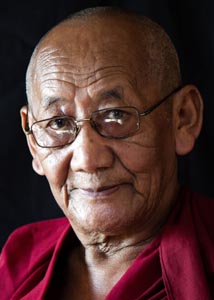Name: Yeshi
(Alias: Yes)
Gender: Male
Interview Age: 78
Date of Birth: 1935
Birthplace: Gyangtse, Utsang, Tibet
Year Left Tibet: 1960
Profession: Monk
Monk/Nun: Currently
Political Prisoner: No

Interview No.: 9B
Date: 2013-12-27
Language: Tibetan
Location: Lugsung Samdupling Settlement, Bylakuppe, Karnataka, India
Categories: Buddhist Traditions, Oppression and Imprisonment
Keywords: childhood memories, Chinese rule -- life under, escape experiences, March 10th Uprising, monastic life, poor/lower class, refugee in India -- life as, thamzing/struggle sessions, Utsang
Summary:
Yeshi lost his parents at a very early age and was raised by his grandparents. They were poor and did not own any land so they earned a livelihood by catering to travellers. He recalls being ordained as a monk at the age of 8 in Lhatse Choedhe, the local monastery, and successfully memorizing the Buddhist texts. When he was 23 years old, Yeshi left for Sera Monastery in Lhasa to study advanced Buddhist philosophy.
Yeshi remembers that he was at the choera 'debating courtyard' of Sera Monastery when the Chinese army bombarded the Potala Palace in 1959. He hid in his room as bombing of the Palace continued for two days and the shelling of his monastery as well. Many monks went to gather weapons and defend the monastery. Yeshi recounts the story of his escape from Sera Monastery back to Lhatse Choedhe hoping for a normal monastic life.
The Chinese army soon arrived in his village and introduced the Revolution of Democracy. The monks continued to try and practice Buddhism but also had to grow their own crops, which they had never done before. The Chinese held indoctrination classes and forced some monks and laypeople to rise against their past leaders. Yeshi witnessed many thamzing 'struggle sessions' of the senior monks of the monastery. He then gives an exciting story of his escape to Nepal.
Interview Team:
- Marcella Adamski (Interviewer)
- Tenzin Yangchen (Interpreter)
- Pema Tashi (Videographer)

